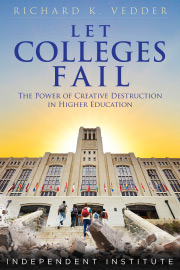When I am asked “what is the single biggest problem with higher education in America?” some expect me to talk about the high costs, excessive tuition fees, abysmal inefficiencies, learning deficiencies, or poor vocational outcomes characterizing America’s colleges and universities today. But there is a more fundamental problem: increasingly, participants in the learning experience at American universities are afraid to say what they believe. There is growing self-censorship arising from fears that there can be very severe negative consequences from saying something that is not acceptable to the campus community.
We see this with the canceling or disruption of outside speakers, with administrative imposed speech codes or narrow zones where free speech is permitted, and with other attempts to impose politically correct ideology. The lack of viewpoint differences on campuses is often striking given administrative bloviating about a commitment to “diversity,” typically defined in terms of biological attributes like skin coloration.
Now a new organization of politically highly diverse academicians has been created, the Academic Freedom Alliance. Such iconic far left academicians as Cornel West of Harvard (and soon to be Union Theological Seminary) and equally renowned scholars of the right as Robert George of Princeton have joined together because they uniformly believe that the academy is the place where all sorts of diverse ideas can be discussed in a robust but peaceful fashion as we search for a better society. Learning and wisdom comes from examining multiple, competing ideas; universities in authoritarian societies where dissent is stifled are rarely places of distinction.
Indeed, the evolution of the modern great universities is most associated, appropriately, with the Enlightenment in Europe arising out of the Renaissance and Reformation after 1450, and reaching its apogee politically with England’s peaceful Glorious Revolution and the American Revolution less than a century thereafter. And with that came a flowering of scientific inquiry, extraordinary developments in the arts, literature and philosophy—the era of Shakespeare, Galileo, da Vinci, Rembrandt, Newton and Locke. Universities provide intellectual communities where original thinkers, scientists, artists and others can flourish. The new Alliance clearly does not want universities to lose the curiosity, the vitality, or the creative intellectual diversity that spawned the Modern Age. Rather than a Cancel Culture, we need true Marketplaces of Ideas, Republics of Letters reborn and revitalized.
To be sure, there are a number of fine existing organizations that support academic freedom and an environment of feisty but civil debate on a multiplicity of issues. Let me name five. First, of course, is the American Civil Liberties Union (ACLU), now beginning its second century, longtime a supporter of free expression. In recent years, however, the ACLU has diverted much of its activity away from First Amendment concerns towards such social issues as gay marriage, and supporting the right to abortion. Groups like the National Association of Scholars (NAS), and the American Council of Trustees and Alumni (ACTA), are supportive of academic freedom and champions of expressions such as the Chicago Principles, but they too take on a myriad of other issues as well. A few years ago, the Heterodox Academy was created to promote free expression within the academic community.
Last and certainly not least, the Foundation for Individual Rights in Education (FIRE) has been a feisty and successful defender of campus free expression. But FIRE has a broader mission, and is heavily embroiled in defending student rights in things like sexual assault cases, where college administrations sometimes seem to follow the judicial precedent of the Spanish Inquisition rather than traditional due process.
By including a large number (200, according to news accounts, and growing) of highly respected academics of widely varying political persuasions, the Academic Freedom Alliance will hopefully be a powerful and formidable opponent of those wishing to enforce ideological conformity and punish campus denizens whose ideas many view as wacky, impractical, or otherwise unwise. These seemingly crazy people often appropriately force more mainstream thinkers and writers to justify their position. Competition is good in the material world of economics, but just as important in the marketplace of ideas, the modern college or university. Hopefully, the new group will aggressively challenge and even shame institutions into promoting the expressions of a very wide range of ideas.













